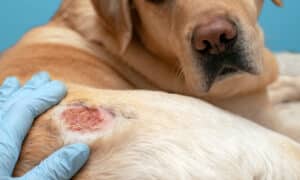“This post contains affiliate links, and I will be compensated if you make a purchase after clicking on my links.”
Many dog owners are using products they believe are helpful for the health of their dog, and do not realize some of these very products are opening up the dog to very real possibilities of developing more serious health issues. One of these health concerns is CML (canine malignant lymphoma) in dogs. Let’s look a bit deeper into how CML in dogs commonly occurs.
CML in dogs
Studies conducted by epidemiologists have very strongly suggested a direct relationship of the development of CML in dogs relating to exposure to common household chemicals all home owners have, yard pesticides, and the use of manufactured flea control products. These studies on the development of CML have been used as a method for identifying non-Hodgkin’s lymphoma in humans.
The scientific methods used included a tertiary-care veterinary hospital over a three year time frame. The number of control dogs totaled 240 canines with benign tumors, 230 dogs being surgically treated with unrelated cancer conditions, and 263 dogs with confirmed lymphoma. The case study covered exposure to lawn pesticides, common chemicals used in cleaning home interiors, and manufactured flea and tick control medications. Control information was gathered from the dog’s owners and covered demographics, environmental conditions, and all known medical conditions of the dogs.
The results were conclusive for yard/lawn care pesticides applied by the home owners as well as for professionally applied lawn treatments. The increased risk of CML in dogs went up seventy percent! Surprisingly, the possible risk increase was not evident for flea and tick applied medications.
The epidemiologist’s conclusions are the home owner who uses either self-applied or professionally applied lawn care pesticides increase the risk of CML in dogs developing. To my line of thinking this only makes sense if your dog spends a great deal of time in your yard, and the transfer of strong pesticides from your lawn to the dog is bound to take place.
How do you feel about this problem? Please feel free to leave comments below.


















Linda
says:I just found out my Beagle has cancer. I was told that round up causes cancer and we use it in our yard a lot. We spray our driveway for weeds and use it to kill Poison Ivy and keep our patio cracks weed free. I had 2 gorgeous Rottweillers that both passed away this year. I am devastated. I love a pretty yard and I love to garden but I had no idea it would cost me all three of my dogs. All three dogs were less than 7 years old. PLEASE don’t use round up or any pesticides on your lawn and I will also never use frontline again either. I am so sad about my dogs. I feel awful.
Ann
says:Many pesticides and in the past vaccinations ie live attenuated Parvo vaccine have a great deal to answer for. Pain and suffering to pups and adults due to the spread of the live disease on droppings – hidden from the public. How did Parvo spread almost overnight around the world ? On vaccines – drug companies stood to make literarily millions with the spread of the disease picked up off the grass or footpaths after a dog had been vaccinated with live vaccine.
Research is done but Animal Remedy boards overseas do not have the labs to test the products that drug companies recommend.
Vets – do not and cannot do the necessary research into vaccines and take the recommendations of drug companies
Getting back to lawns – one cannot sterilise them, but a good fertiliser is – lime – it kills must things and makes the lawns grow well
Judy
says:We have termite control planted into the dirt by a professional bug control company. Could this be doing the same thing? I have a boxer with cancer now
I heard about this problem years ago and had Plastic grass. (like astroturf) laid in the dogs compound. Problem solved and it is so easily cleaned
Lynn
says:Considering we have known for twenty or thirty years now that herbicides cause non-Hodgkins lymphoma in people I don’t know why we’d be surprised to find out it causes nHl in dogs – especially since dogs run around on, lie down in and play in the lawn far more than people do. Of course, on many lawns, it’s kids who run around, roll around and play on the lawn, too. Does that suggest anything to you — like maybe it’s more important to have a safe lawn than a nice, perfect green one. A few dandelions are less important than healthy kids and pets.
Wendy
says:I lost my GSD last year from lymphoma. She had just turned 6. While we never used chemicals on our own yard we did take her to parks and fields where I don’t know what the grass was treated with. Biggest heartbreak of my life. I vow to never poison my own yard for the sake of my daughter and my dogs.
Exie King
says:I lost a GSD (my heart) in 1996 to Lymphosarcoma. He was 9 years old and I had learned at dog shows that Round Up would cause cancer in dogs, but I never used it or pesticides in my yard at home, as I had insecticide posioning from spraying around the outside of my boarding kennel yards to prevent the hoards of ticks from getting in the kennel yards. I used tick crystal after that at the kennel to prevent the tick infestation. Thank you for the article, it explained a lot to me, he was the dog I used in my obedience classes for demonstration. The classes were held in the yard outside the kennel, where I have to assume he picked up the insecticide.
Buck Harmon
says:The dogs could be getting sick from a number of things. Lawn products have been tested and used for years.
Melanie Hollifield
says:This is NO surprise to me! I am a follicular lymphoma survivor and proud owner of a GSD. My lawn may be full of weeds but I know we are safer for it. Roundup is a known Lymphoma accelerator. It is also now in our food supply thanks to Monsanto. Google it and be informed!
Louise Shimmel
says:It’s long been known (I read this in veterinary literature probably 15 years ago) that there’s a correlation of increased lymphosarcoma in dogs with owners who use Weed ‘n’ Feed products – every time they fertilize the lawn, they are applying a pesticide. If the dog ingests grass, as many do, I would think they could be ingesting pesticide;; if they are walking on the lawn and lick their feet after application; if you water the lawn after application, and the water pools in a low spot, and the dog drinks it … Here’s a 1991 reference I just found: articles.latimes.com/1991-09-20/news/vw-2514_1_common-weed-killer. As a wildlife rehabilitator, I’ve had robins come in dying from drinking from those low spots after a fertilizer application. The ‘weed’ part is a pesticide. Don’t use it.
Donna Campo
says:I used lawn care for years and both of my Dogs ended up with lymphoma. My GSD was diagnosed at age 2 I immedialtley started chemo after his 4 month treatment he stayed in remission for 6 months. I decided to retreat him again and he will now be 8 this month. My lab was diagnosed 3 years ago and unfortualey even with chemo she pasted away a year ago. I have and never will use any lawn care again and i strongly recommend any pet owners not to use it as I feel this was why both of my dogs contracted lymphoma
Jill Doherty
says:I lost my favorite dog last month at 6.5 yrs old from Stage 4 lymphoma. He was a working, schutzhund titled German Shepherd dog. I never used pestisides or lawn treatments, but he did track in fields with possible pesticides for his tracking/schutzhund training. I hope that wasn’t the cause.
Kimberly
says:Jill, I’m so sorry for your loss.
Nancy
says:My GSD was diagnosed with lymphoma three months ago, he is now in his final days. While he is still eating/drinking well and can still get around, his breathing is rasphy and he is panting more and more. We do not use lawn treatments & have used flea/tick meds very sparingly, only when the ticks are at their height.
LINDA RATLIFF
says:What are the symtons of this disease? You tell what causes it but no information on what to look for in your dog,so please could you enlighten us on this?
Ron Miller
says:Sorry — didn’t think to include that.
The most common sign that an owner will find indicating possible CML is swollen lymph nodes, usually under the chin. Less frequent will be swollen nodes in the “armpits” and groin areas.
Unfortunately there are at least 6 types of CML, and it can show up with many other symptoms, such as coughing, diarrhea, vomiting, and a multitude of other signs that “something’s not right” with your dog.
In short, there’s no way for you to definitively say your dog has CML — even if swollen lymph nodes show up. Other things can cause that, too. You have to let your veterinarian sort this out.
Eileen Smith
says:I have suspected this for a long time and have stopped using yard treatments for a while. I love the beautiful looking yard but my love for my “boys” is stronger. I have also stopped using flea and tic products since they are dangerous to humans and if I cannot use them for myself I do not feel comfortable using them for my dogs.